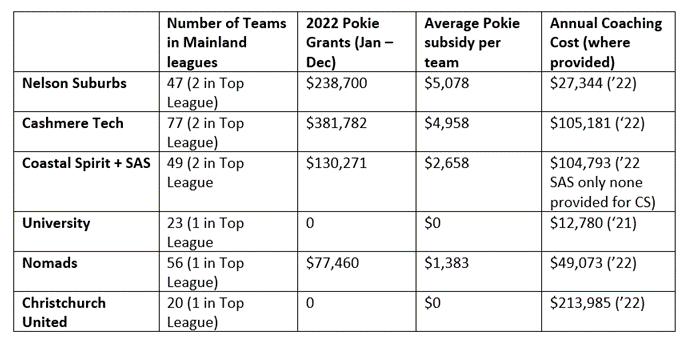Like anything, community grants are subject to supply and demand issues. As the supply of money grows, perhaps due to legislation (in the case of pokies and community trusts) then the demand for that money grows accordingly: costs like roles which were previously done by volunteers, friends and families. There will never be enough money to meet the wants of the community sector.
Let’s look at the demand side for Football clubs. What I have noticed over the years is that some football clubs have close ties to specific venues who then host pokies who are exceedingly generous to said club. This is often despite Section 113 of the Gambling Act which prohibits key people involved in a venue to have a say in where grants go. Anyone found guilty of doing this will be fined up to $10,000. As an aside if I were in charge I might also consider putting the $10k fine up: perhaps to the value of the money siphoned off to the grant seeker.
You can see some of those activities in these old blogs:
http://www.delfi.co.nz/blog/looking-at-grassroots
http://www.delfi.co.nz/blog/update-on-air-rescue-trust-2022
http://www.delfi.co.nz/blog/a-million-dollars-a-month
The impact of these relationships can be quite profound. It would be helpful if sports peak bodies published the number of registered players that each club has, but they don’t. Nor do many organisations publish their annual accounts or player numbers. But we do have some hardish data:
- DIA’s Granted.govt.nz website. The dollar amount below is as at 8 July for the full calendar year. Great the figures for the full 2022 year now published, and great to see data back to 2017. However the data still needs to be cleaned - there are multiple ways to spell the same entity, and some of course change name to reduce detection.
- Mainland’s competition framework which I can use as a proxy for player numbers. I confess to counting these up off a website counting up all the junior, youth and senior grades without my glasses so may not be hugely accurate, but likely within cooee. It will also exclude in house footie programmes that tend to be for the young kiddos, or in the case of University the social intra club teams. In brackets I have put the number of male and female teams in the higher cost top league which involves considerable travel.
- Annual accounts where they are provided from Societies.govt.nz. Coaching costs are interesting: see this Stuff piece around how some clubs approach this. https://www.stuff.co.nz/sport/football/129546987/the-sham-of-amateurism-in-top-club-football
- What is a reasonable pokie subsidy? I don’t know why Cash Tech need so much: the many times our kids played them over the years we played at a Council park at the back of a school. Their kit was fancy though! I do acknowledge that organising all these teams would take a lot of admin effort but families do pay to play. And of course: grants can’t be used for support of professional sports.
- Christchurch United stands out as paying a lot for coaching yet not having any grants. I suspect a lot of this is underpinned by their Academy in terms of paying that cost.
- Universities again gets no grants. I expect they benefit from association with the University as a home base.
- SAS’s coaching costs are pretty high. Looking at 2016, there was a line item “Coaching Training and Courses” with a cost of $11,286. Six years later the Coaching figure is $104k.
- How do funders determine where money is needed. What is the “right” level of user pays? How much of the community subsidy goes to subsidising the clubrooms aspect of the organisation? How much to support the amateurs playing at the top level for their clubs? How do the clubs manifest the national sporting strategies? And are they financially rewarded for this? I am totally happy to benchmark this for you funders!
Rugby is a different kettle of fish. DIA’s report shows that Rugby received $23.46m in 2022. I’ll look at that later.
I write about this stuff as I believe that we need to understand where funding comes from, where it goes, and how it gets there. No one else seems all that interested. As a citizenry we allow both those supplying money and those asking for money to operate, and as a community we need to ensure we have oversight over the organisations they choose to fund. Love to talk with you if you think this is at all interesting, and if you want to dive into the data a bit more than happy to do so. Check out my website http://www.delfi.co.nz/
Photo by Peter Glaser on unsplash


 RSS Feed
RSS Feed